
Pearl Comfort Sydenstricker Buck was an American writer and novelist. She is best known for The Good Earth, the best-selling novel in the United States in 1931 and 1932 and which won her the Pulitzer Prize in 1932. In 1938, Buck became the first American woman to win the Nobel Prize in Literature "for her rich and truly epic descriptions of peasant life in China" and for her "masterpieces", two memoir-biographies of her missionary parents.
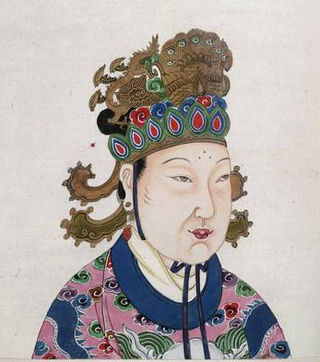
Wu Zetian, personal name Wu Zhao, was the first and only female emperor in Chinese history, and de facto ruler of the Tang dynasty from 665 to 705, ruling first through others and then in her own right. From 665 to 690, she was first empress consort of the Tang dynasty and then, after his death, empress dowager. Unprecedented in Chinese history, she subsequently founded and ruled as female emperor of the Wu Zhou dynasty of China from 690 to 705. She was the only female sovereign in the history of China widely regarded as legitimate. Under her 40-year reign, China grew larger, becoming one of the great powers of the world, its culture and economy were revitalized, and corruption in the court was reduced. She was removed from power in a coup and died a few months later.

Empress Dowager Cixi ; born Yehe Nara Xingzhen, was a Chinese noblewoman of the Manchu Yehe Nara clan, concubine and later regent who effectively controlled the Chinese government in the late Qing dynasty for almost 50 years, from 1861 until her death in 1908. Selected as a concubine of the Xianfeng Emperor in her adolescence, she gave birth to a son, Zaichun, in 1856. After the Xianfeng Emperor's death in 1861, the young boy became the Tongzhi Emperor, and she assumed the role of co-empress dowager, alongside the Emperor's widow, Empress Dowager Ci'an. Cixi ousted a group of regents appointed by the late emperor and assumed the regency along with Ci'an, who later died. Cixi then consolidated control over the dynasty when she installed her nephew as the Guangxu Emperor at the death of her son, the Tongzhi Emperor, in 1875. This was contrary to the traditional rules of succession of the Qing dynasty that had ruled China since 1644.
Lü Zhi, courtesy name E'xu (娥姁) and commonly known as Empress Lü and formally Empress Gao of Han, was the empress consort of Gaozu, the founding emperor of the Han dynasty. They had two known children, Liu Ying and Princess Yuan of Lu. Lü was the first woman to assume the title Empress of China and paramount power. After Gaozu's death, she was honoured as empress dowager and regent during the short reigns of Emperor Hui and his successors Emperor Qianshao of Han and Liu Hong.

The Xianfeng Emperor, also known by his temple name Emperor Wenzong of Qing, personal name Yizhu, was the eighth emperor of the Qing dynasty, and the seventh Qing emperor to rule over China proper, reigned from 1850 to 1861. During his reign, the Qing dynasty experienced several wars and rebellions including the Taiping Rebellion, Nian Rebellion, and Second Opium War. He was the last Chinese emperor to exercise sole power.
Empress dowager is the English language translation of the title given to the mother or widow of a Chinese, Japanese, Korean, or Vietnamese emperor in the Chinese cultural sphere.

Empress Xiaozhenxian, of the Manchu Bordered Yellow Banner Niohuru clan, was a posthumous name bestowed to the wife and empress consort of Yizhu, the Xianfeng Emperor. She was empress consort of Qing from 1852 until her husband's death in 1861, after which she was honoured as Empress Dowager Ci'an.
The Empress Dowager is a 1975 Hong Kong historical film directed by Li Han-hsiang and produced by the Shaw Brothers Studio, starring Lisa Lu as Empress Dowager Cixi.

Empress Xiaozheyi, of the Manchu Bordered Yellow Banner Arute clan, was a posthumous name bestowed to the wife and empress consort of Zaichun, the Tongzhi Emperor. She was empress consort of Qing from 1872 until her husband's death in 1875, after which she was honoured as Empress Jiashun.

Empress Xiaokangzhang, was the consort of the Shunzhi Emperor and mother of the Kangxi Emperor during the Qing dynasty. She was part of the Manchu Bordered Yellow Banner Tunggiya clan. Xiaokangzhang was a posthumous name bestowed on her; she was honoured as Empress Dowager Cihe during the reign of her son and was posthumously honoured as empress, although she never held the rank of empress consort during her lifetime.

Noble Lady Shun, of the Manchu Niohuru clan, was a consort of the Qianlong Emperor of the Qing dynasty.

Empress Orchid (2004) is a novel by Anchee Min which was first published in Great Britain in 2004. It is written in first person and is a sympathetic account of the life of Empress Dowager Cixi - from her humble beginnings to her rise as the Empress Dowager.
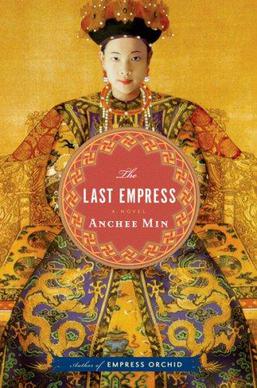
The Last Empress is a historical novel by Anchee Min that provides a sympathetic account of the life of Empress Dowager Cixi, from her rise to power as Empress Tzu-Hsi, until her death at 72 years of age. Akin to the bestselling and preceding novel in the series Empress Orchid, names within the story are different in spelling but retain the same pronunciation - allowing the reader to identify each relevant character to his or her real life counterpart.
The ranks of imperial consorts have varied over the course of Chinese history but remained important throughout owing to its importance in the management of the inner court and in imperial succession, which ranked heirs according to the prominence of their mothers in addition to their strict birth order. Regardless of the age, however, it is common in English translation to simplify this hierarchy into the three ranks of empress, consorts, and concubines. It is also common to use the term "harem", an Arabic loan word used in recent times to refer to imperial women's forbidden quarters in many countries. In later Chinese dynasties, these quarters were known as the inner palace or the back palace. In Chinese, the system is called the Rear Palace System.

Beyond the Realm of Conscience is a 2009 Hong Kong television series. Produced by Mui Siu-ching, the serial is one of two TVB productions to celebrate along with the channel's 42nd anniversary, the other being Born Rich. The drama aired five days a week on the TVB network with 45-minute episodes starting 19 October 2009. It stars Charmaine Sheh, Tavia Yeung, Moses Chan and Kevin Cheng as the main leads.
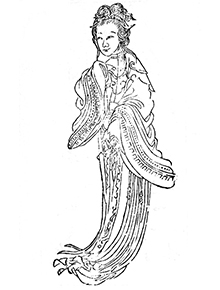
Consort Li, imperial consort rank Chenfei, was an imperial consort of the Song dynasty of China. She was a concubine of Emperor Zhenzong and the mother of Emperor Renzong. She was posthumously honored as Empress Dowager Zhangyi (章懿皇太后), after Emperor Renzong discovered that she was his real mother.

Sorrows of the Forbidden City is a Mandarin Chinese film released in 1948. It was directed by Zhu Shilin and filmed in Hong Kong. After the founding of the People's Republic of China in 1949, the film was criticized as "treasonous" for its positive depiction of the Emperor. However, its reputation has risen in recent years, and it was ranked as the 37th best Chinese film of all time in the Hong Kong Film Awards poll of 2013.
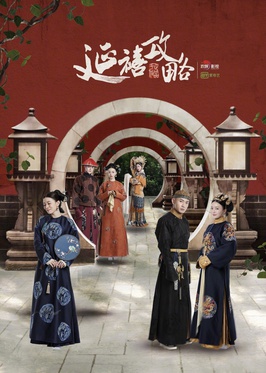
Story of Yanxi Palace is a Chinese historical series recounting the struggles of a palace maid in the court of the Qianlong Emperor. It was created by Yu Zheng, with original screenplay written by Zhou Mo, and later developed into a novel by Xiao Lian Mao. Starring Wu Jinyan, Charmaine Sheh, Qin Lan, Nie Yuan, Tan Zhuo and Xu Kai, the series premiered on iQiyi from July 19, 2018 to August 26, 2018. During its run it was streamed more than 15 billion times.

Concubinage in China traditionally resembled marriage in that concubines were recognized sexual partners of a man and were expected to bear children for him. Unofficial concubines were of lower status, and their children were considered illegitimate. The English term concubine is also used for what the Chinese refer to as pínfēi, or "consorts of emperors", an official position often carrying a very high rank. The practice of concubinage in China was outlawed when the Chinese Communist Party came to power in 1949.
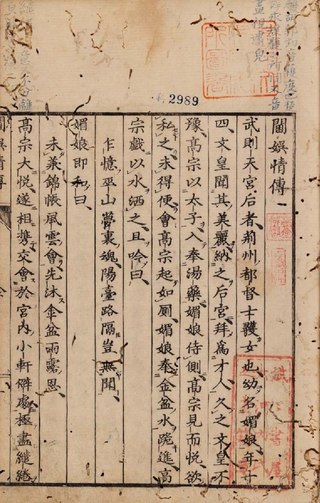
Ruyijun zhuan (如意君傳), translated into English as The Lord of Perfect Satisfaction, is a Chinese erotic novella written in the Ming dynasty by an unknown author. Set in the Tang dynasty, it follows the political career and love life of Empress Wu Zetian. One of the earliest erotic novels published in China, it was repeatedly banned after its publication.
















